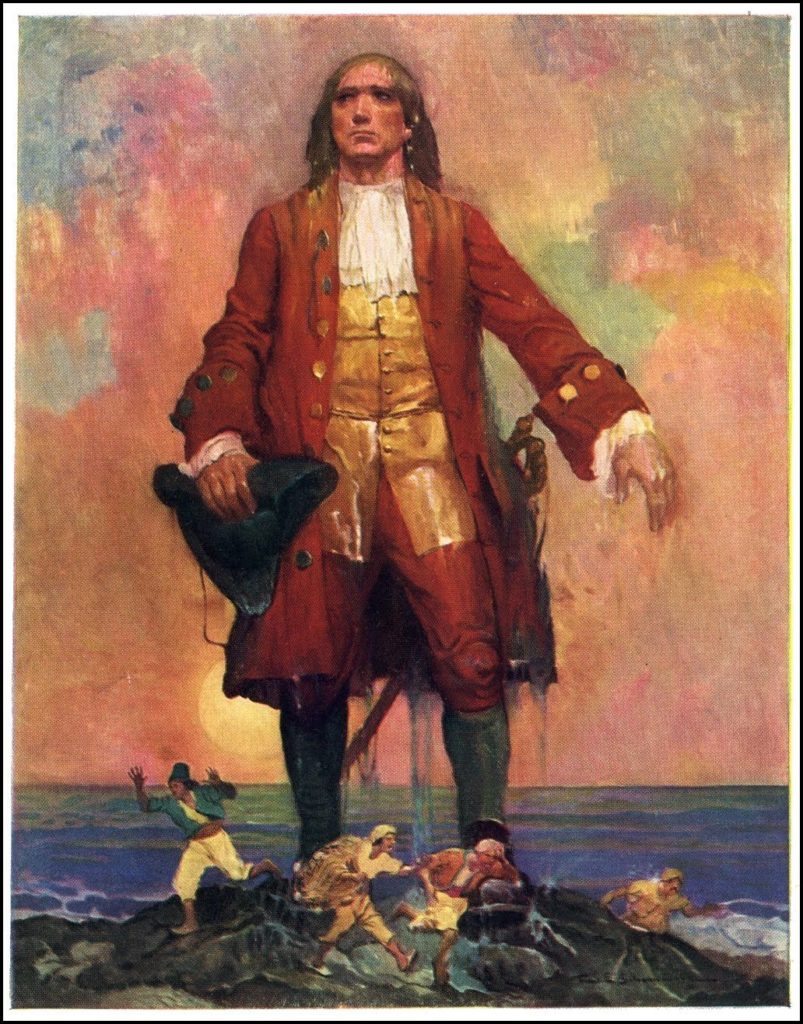 Gulliver's Travels - 1913 cover (public domain via Wikimedia Commons)
Gulliver's Travels - 1913 cover (public domain via Wikimedia Commons)According to Dublin writer Jonathan Swift, on May 4th, 1699 ship's surgeon Lemuel Gulliver set sail on the Antelope from Bristol harbour on his first journey, headed initially for the South Seas . . . .
MAY the Fourth is today widely known as Star Wars Day, but of course no one said to Lemuel as the Antelope sailed out of port that spring morning “May the Force be with you.” Instead his adventures and meetings “Into Several Remote Nations of the World” see him involved in various intrigues, fights and disputes — his misadventures become more calamitous and malignant as time goes on. He is shipwrecked, abandoned, attacked by strangers, then attacked by his own crew. Lemuel Gulliver met few happy campers on his voyages.
Plot:
+ Lemuel Gulliver travels to strange places such as Brobdingnag and Lilliput to meditate on their ghastliness. But the self-important Gulliver fails to see that the terrible worlds he visits are entirely like his own. He embarks on four voyages in total.
Message:
+ We are all condemned to vanity, misanthropy, or at best indifference.
Is the message usually adhered to by filmmakers?
+ Rarely. Most feature wacky high jinks in Lilliput.
Inspiration:
+ It's claimed that the inspiration for Gulliver came from the profile of ‘Napoleon’s Nose’ on Cavehill in Belfast. (Jonathan served as vicar in Carrickfergus, Co. Antrim so would have known Belfast well).
Places visited:
+ Lilliput is the one that has entered popular imagination. Gulliver doesn’t seem to like it one bit: “I cannot but conclude the bulk of your natives to be the most pernicious race of little odious vermin that nature ever suffered to crawl upon the surface of the earth," he announces.
Brobdingnag fares little better:
"The learning of this people is very defective; consisting only in morality, history, poetry, and mathematics, wherein they must be allowed to excel,” he says of the inhabitants.
Example of Swift’s true political satire:
+ The war between the Big-Endians and the Little-Endians in Lilliput. The war is based on a reading from the holy book of Lilliput the Brundecral which states in no uncertain terms: That all true believers shall break their eggs at the convenient end. This is Swift at his best satirising the religious schism created by Henry VIII’s break with Rome, leading eventually to the English Civil War.
Words invented by Swift, which have entered the language:
+ The first name Vanessa, and the word ‘yahooo’ - the vicious disgusting creatures which Gulliver encounters in his fourth voyage.
Parts often left out of children’s books:
+ The Academy of Lagado’s attempts to “reduce human Excrement to its orginal Food.” The Academy’s plans to extract sunbeams from cucumbers is usually preferred.
What they thought in former times:
+ The novelist Thackeray thought the Travels were brilliant, but qualified this by saying it was “filthy in word, filthy in thought, furious, raging, obscene.” Voltaire hailed Swift as the ‘English’ Rabelais. Michael Foot (former leader of the Labour party) declared: “Everyone standing for political office in Dublin, the United States or London should have a compulsory examination in Gulliver’s Travels.”
George Orwell and Aldous Huxley were both influenced by the book.
What we think now:
+ A classic, described variously as a satire, a proto-science fiction and a forerunner of the modern novel.
But it’s often mistaken for a children’s book.
+ What Swift would have made of this verdict:
He would have appreciated the bitter irony that Gulliver, which he wrote as a biting satire aimed at a depraved and miserable universe, has become a children’s story of Disneyland proportions.

